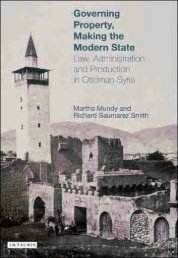The Young Turk Period, 1908-1918 - PSI424
The Young Turk Period, 1908-1918 - PSI424
The Young Turk Period, 1908-1918 - PSI424
You also want an ePaper? Increase the reach of your titles
YUMPU automatically turns print PDFs into web optimized ePapers that Google loves.
312 <strong>The</strong> Rise of Modern <strong>Turk</strong>ey, 1808-1975<br />
fictitious sale, being given the names Yavuz Sultan Selim and Midilli, with the<br />
squadron commander, Admiral Souchon, becoming commander of the Ottoman<br />
Black Sea fleet while his sailors were given fezzes and Ottoman uniforms and<br />
enlisted into the sultan's navy. 144 Most members of the cabinet continued to oppose<br />
entry into the war at least until the desired safeguards had been secured. Enver and<br />
Cemal advocated policies that would bring the empire into war on Germany's side,<br />
while Talat mediated between the two groups. Germany by now was anxious for<br />
the Ottomans to enter, proposing attacks into the Crimea or around the Black Sea<br />
against Odessa and toward the Suez Canal to divert the Russians and the British.<br />
Britain and Russia however began to encourage Ottoman neutrality and started<br />
negotiations to provide the long-desired guarantees of Ottoman independence and<br />
territorial integrity, even offering concessions regarding the Capitulations if only<br />
the Porte stayed out. 145 <strong>The</strong> relative stalemate that emerged on the western front<br />
and Russian victories in the east further strengthened the Ottoman advocates of<br />
peace and hindered Enver.<br />
Enver and his allies therefore sought out and pushed through more provocations<br />
to force the Western allies to declare war on the Ottoman Empire. On September 7<br />
the Capitulations were abolished, inflicting a major blow on the economic interests<br />
of the Entente powers in particular. 146 On September 14 Cemal, as minister of the<br />
navy, authorized Admiral Souchon to take his ships into the Black Sea and attack<br />
any Russian ships or bases he might encounter in the name of the Ottoman government,<br />
thus most certainly providing the desired war provocation, but this was<br />
countermanded by the cabinet. 147 On October 1 the Ottoman customs duties, traditionally<br />
controlled by the powers through the Capitulations, were unilaterally increased<br />
by 4 percent. <strong>The</strong> foreign post offices in the empire, including those of<br />
Germany, were closed and taken over. Foreigners in the empire were made subject<br />
to Ottoman laws and the Ottoman courts. 148 Enver personally ordered the<br />
Dardanelles and the Bosporus closed to foreign ships to prevent the Entente from<br />
intervening. 149 On October 11 the German ambassador secretly promised delivery<br />
of 2 billion kurus, of gold to the Ottoman government if war was declared, 150 and<br />
arrival of the gold on October 21 cleared the way for action. Enver and Cemal<br />
again gave Souchon authority to attack the Russians in the Black Sea to force a<br />
war declaration without consulting the remainder of the cabinet. On October 29<br />
Souchon bombarded the Russian coast and destroyed several Russian ships. Sait<br />
Halim and Cavit were furious and got Enver to send a cease-fire order to Souchon<br />
as well as apologies to the Entente governments. 151 But it was too late. Enver's<br />
apologies included claims that the incidents had in fact been provoked by the<br />
Russian Black Sea fleet. On November 2 Russia replied with a war declaration on<br />
the Ottoman Empire. Britain and France followed three days later. Britain proclaimed<br />
the annexation of Cyprus and, soon afterward (December 18), the independence<br />
of Egypt under British protection. Khedive Abbas Hilmi, who was then<br />
visiting the sultain in Istanbul, was replaced with Huseyin Kamil Pa§a, son of the<br />
old khedive, Ismail. Already on November 11 the sultan had replied with the<br />
Ottoman war declaration, using his claim to be caliph to add a proclamation of<br />
Holy War against the Entente and asking all Muslims, particularly those in the<br />
British and Russian possessions, to join in the campaign against the infidel. Interest<br />
payments on all the public debt bonds held by investors of the enemy nations were<br />
suspended also, thus relieving the Porte of a considerable financial burden, at least<br />
until the war was over, and adding one more crack to the crumbling order of<br />
European society (December 17, 1914). 152












